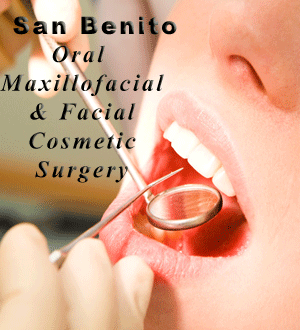Anesthesia in the Dental Office
An upcoming visit to an oral and maxillofacial surgeon is a potential anxiety producer. In this case, the individual typically is most concerned with possible pain. Modern technology now makes it possible to perform complex surgery in the office with little or no discomfort. Knowing this should start to bring your anxiety level down to a minimum. During surgery, one or more of the following is used in controlling pain and anxiety: local anesthesia, nitrous oxide, intravenous sedation and general anesthesia.
Anesthesia in the Dental Office
Local Anesthesia is the anesthesia known to you from your family dentist. After placing a topical anesthetic on the injection site, a local anesthetic (usually lidocaine--novocaine is no longer used) is injected to numb the surgical area. You can eat before the surgery if only local anesthesia will be used. Local anesthesia is advised for simple extraction but not for complex or surgery of impacted teeth. During the surgery you will feel pressure, but you experience no pain.
Nitrous oxide (laughing gas) is used to relax you. You breathe in the gas through your nose and start to feel light-headed and you will notice some tingling in your arms and legs. The laughing gas does not put you to sleep but it is very valuable for relaxation.
Intravenous sedation requires the placement of a needle in your blood vessel. This allows us to give you the necessary medications which will make you sleepy. Most frequently used medications are the benzodiazepines (Versed®, Valium®) in combination with narcotics (Demerol®, Fentanyl®). Often the surgeon also uses nitrous oxide with an intravenous medication. These medications make you sleepy and you forget about the surgical procedure. During the surgical appointment, we use monitoring devices such as ECGs (shows your heartbeat), a blood pressure cuff and a pulse oximeter (measures the oxygen content of your blood). After the procedure you will spend some time in a recovery room, and you will need someone to drive you home. Occasionally you will feel sleepy for hours, and it will take 6-8 hours for the numbness in your lips and tongue to wear off.
General anesthesia is a similar procedure to intravenous sedation, but the level of sedation is deeper. The intravenous medication will be given and the same monitoring devices are used. The most commonly used drug is Brevital® and Propofol. As with intravenous sedation, you need someone to drive you home.
Pain Medication: The surgeon can prescribe for you a variety of pain-relieving drugs. The main categories are the narcotics, the nonsteroids (NSAID) or plain Tylenol®. Narcotics are usually combined with Tylenol® or Aspirin. Tylenol III® (Tylenol® with codeine) Vicodin® or Vicodin ES® (Tylenol® with hydrocodone). Darvocet® (Tylenol® with propoxyphene). Side effects of these drugs are sleepiness, nausea, and vomiting. The best way to avoid nausea and vomiting is to not take the medication on an empty stomach and to reduce the dosage. These side effects are very common and you should contact your surgeon if you are concerned about the response you have to the medication.
Nonsteroidals (NSAID) are a large group of very effective painkillers without the side effects seen by narcotics. Aspirin Ibuprofen (Motrim®, Advil®) Naprosyn These drugs are usually not used in patients who have asthma or a history of stomach problems. Your surgeon will usually prescribe narcotics for the first few days. After the initial trauma from the surgery has gone, the nonsteroidal drugs are very effective for pain control. A possible plan to control your pain would be the following: the first few days, Vicodin®; after that, Ibuprofen during the day and if necessary Vicodin® at night.

About Us
Dr. Brian Carr holds a both a Dental Degree and Medical Degree. He is a member of the the American Association of Oral and Maxillofacial Surgeons (AAOMS) and a diplomate of the American Board of Oral & Maxillofacial Surgery (ABOMS). Dr Carr is an Associate Clinical Professor at UCSF and has taught facial trauma reconstruction at Zuckerberg San Francisco General Hospital for several years. Dr. McBride has been practicing oral and maxillofacial surgery in the Hollister, California area for over twenty years. He is also a Clinical Assistant Professor in the Department of Oral and Maxillofacial Surgery at University of California San Francisco.Our staff is highly trained and qualified to handle all of your needs. We invite you to come in for a consultation.
We are here to answer your questions, please give us a call at (831) 636-9808 or please use our contact page.
More Information
 Thanks to research breakthroughs, clinical advances and instrumentation innovations pioneered by skin surgery experts, the majority of cosmetic surgeries is now minimally invasive and requires only local or regional anesthesia. This translates into superior patient safety while reducing the all-important "downtime" and recovery period. In addition, new developments and the latest techniques are constantly enhancing the results of many established skin surgery procedures.
Thanks to research breakthroughs, clinical advances and instrumentation innovations pioneered by skin surgery experts, the majority of cosmetic surgeries is now minimally invasive and requires only local or regional anesthesia. This translates into superior patient safety while reducing the all-important "downtime" and recovery period. In addition, new developments and the latest techniques are constantly enhancing the results of many established skin surgery procedures.  Did you know that dental implants are frequently the best treatment option for replacing missing teeth? Rather than resting on the gum line like removable dentures, or using adjacent teeth as anchors like fixed bridgers, dental implants are long term replacements that your oral and maxillofacial surgeon surgically places in the jawbone.
Did you know that dental implants are frequently the best treatment option for replacing missing teeth? Rather than resting on the gum line like removable dentures, or using adjacent teeth as anchors like fixed bridgers, dental implants are long term replacements that your oral and maxillofacial surgeon surgically places in the jawbone.Call our offices at (831) 636-9808
Our experienced and professional office staff members are here to help you with all your questions.
We are conveniently located in Hollister, California in San Benito County at 890 Sunset Drive, Suite B-1A in Hollister, CA 95023. Our telephone number is (831) 636-9808. For driving instructions, click here.
Refer a patient by sending secure referrals, attach X-rays and other documents and communicate securely with our clinic.
Refer a patient to San Benito Oral Surgery
Para más información llame a nuestra oficina
(831) 636-9808
Bienvenidos a la oficina de Dres. McBride y Carr. Una práctica para el tratamiento de problemas de los dientes, las mandíbulas y encara.
Somos situados en el Condado San Benito en 890 Sunset Drive, B-1A, Hollister, CA 95023.

 In just a short time, you can melt the years away from your face, looking natural and refreshed. Dr. Carr can provide temporary improvements, such as botox to more permanent solutions such as a neck lift or facial implants,
In just a short time, you can melt the years away from your face, looking natural and refreshed. Dr. Carr can provide temporary improvements, such as botox to more permanent solutions such as a neck lift or facial implants, 